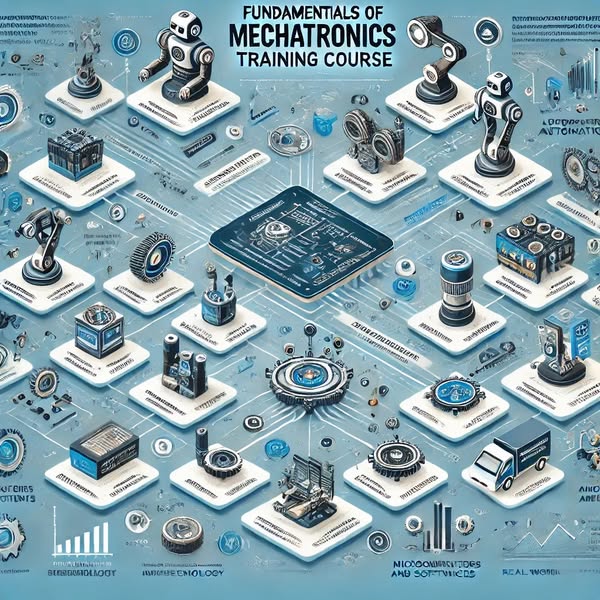📌 General Detailed Information – Fundamentals of Mechatronics
🔹 Course Name:
Fundamentals of Mechatronics
📅 Duration:
4 weeks (Beginner to Intermediate Level)
🎯 Objective:
This course aims to provide a strong foundation in mechatronics, integrating mechanical systems, electronics, sensors, actuators, microcontrollers, and control systems. Learners will develop hands-on skills in designing and implementing automation and robotics applications.
📖 Course Structure:
-
Week 1: Introduction to Mechatronics & Sensors
-
Week 2: Mechanical & Electrical Components (Motors, Actuators)
-
Week 3: Control Systems & Embedded Programming
-
Week 4: Practical Applications in Robotics & Automation
🔧 Tools & Software Used:
-
Microcontrollers: Arduino, ESP32, Raspberry Pi
-
Simulation Software: MATLAB, Proteus, Tinkercad
-
Programming Languages: C, Python (for embedded systems)
-
Hardware Components: Sensors, Actuators, Motors, Power Circuits
🔬 Key Topics Covered:
✔ Basic Electronics & Circuits
✔ Mechanical Systems & Robotics
✔ Motor Control & Actuators
✔ Sensors & Data Acquisition
✔ Control Systems (PID, Open/Closed Loop)
✔ PLC & Industrial Automation
✔ Communication Protocols (I2C, SPI, UART, MQTT)
✔ AI & Machine Learning in Mechatronics
✔ Practical Hands-on Projects
🏆 Learning Outcomes:
✅ Understand the fundamentals of mechatronics systems
✅ Design and integrate mechanical, electrical, and software components
✅ Develop and program microcontrollers for automation
✅ Work with robotics and industrial automation
✅ Implement real-world projects using sensors, motors, and controllers
👨🎓 Target Audience:
🔹 Engineering students (Mechanical, Electrical, Electronics, Mechatronics)
🔹 Technicians and professionals in automation & robotics
🔹 Hobbyists & tech enthusiasts interested in smart systems
📜 Certification:
Upon completion, participants will receive a certificate validating their skills in mechatronics and embedded system integration.
🚀 Kickstart your journey in mechatronics & automation with this hands-on training!




